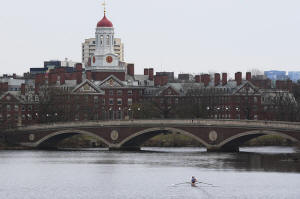Harvard's challenge to Trump administration could test limits of
government power
[April 16, 2025]
By COLLIN BINKLEY
On one side is Harvard, the nation’s oldest and wealthiest university,
with a brand so powerful that its name is synonymous with prestige. On
the other side is the Trump administration, determined to go further
than any other White House to reshape American higher education.
Both sides are digging in for a clash that could test the limits of the
government’s power and the independence that has made U.S. universities
a destination for scholars around the world.
On Monday, Harvard became the first university to openly defy the Trump
administration as it demands sweeping changes to limit activism on
campus. The university frames the government’s demands as a threat not
only to the Ivy League school but to the autonomy that the Supreme Court
has long granted American universities.
“The university will not surrender its independence or relinquish its
constitutional rights,” the university’s lawyers wrote Monday to the
government. “Neither Harvard nor any other private university can allow
itself to be taken over by the federal government.”
The federal government says it’s freezing more than $2.2 billion in
grants and $60 million in contracts to Harvard. The hold on funding
marks the seventh time the Trump administration has taken such a step at
one of the nation’s most elite colleges, in an attempt to force
compliance with Trump’s political agenda. Six of the seven schools are
in the Ivy League.

Harvard is uniquely equipped to push back
No university is better positioned to put up a fight than Harvard, whose
$53 billion endowment is the largest in the nation. But like other major
universities, Harvard also depends on the federal funding that fuels its
scientific and medical research. It’s unclear how long Harvard could
continue without the frozen money.
Already, Harvard’s refusal appears to be emboldening other institutions.
After initially agreeing to several demands from the Trump
administration, Columbia University’s acting president took a more
defiant tone in a campus message Monday, saying some of the demands “are
not subject to negotiation.”
In her statement, Claire Shipman said she read of Harvard’s rejection
with “great interest.” Columbia was previously seen as a prime candidate
to challenge the administration's demands and faced blowback from
faculty and free speech groups when it agreed to make concessions
instead.
“Harvard is obviously a particularly powerful institution. And its
decision has potential to galvanize other universities into some kind of
collective pushback,” said David Pozen, a Columbia law professor who
argued that the government’s demands are unlawful.
Trump threatened Tuesday to escalate the dispute, suggesting on social
media that Harvard should lose its tax-exempt status “if it keeps
pushing political, ideological, and terrorist inspired/supporting
‘Sickness?’”
The impasse raises questions about how far the administration is willing
to go. However it plays out, a legal battle is likely. A faculty group
has already brought a court challenge against the demands, and many in
academia expect Harvard to bring its own lawsuit.
In its refusal letter, Harvard said the government’s demands violate the
school’s First Amendment rights and other civil rights laws.

University poses first big obstacle in administration's push for
change
For the Trump administration, Harvard presents the first major hurdle in
its attempt to force change at universities that Republicans say have
become hotbeds of liberalism and antisemitism.
The conflict is straining the longstanding relationship between the
federal government and universities that use federal money to fuel
scientific breakthroughs. Long seen as a benefit to the greater good,
that money has become an easy source of leverage for the Trump
administration.
Federal money is an investment and not an entitlement, federal officials
wrote in a letter to Harvard last week, accusing the school of failing
to meet civil rights obligations that are a condition for federal aid.
They argued that Harvard has allowed political ideology to stifle
intellectual creativity.
[to top of second column]
|

A sculler rows down the Charles River near Harvard University, at
rear, Tuesday, April 15, 2025, in Cambridge, Mass. (AP Photo/Charles
Krupa)

Trump's campaign has targeted schools accused of tolerating
antisemitism amid a wave of pro-Palestinian protests on U.S.
campuses. Some of the government's demands touch directly on that
activism, calling on Harvard to impose tougher discipline on
protesters and to screen international students for those who are
“hostile to the American values.”
Other demands order Harvard to cease all diversity, equity and
inclusion programs and to end admissions or hiring practices that
consider “race, color, national origin, or proxies thereof.”
Many of the same White House officials who are relishing the
political attacks on the elite institutions are products of such
schools themselves. Trump is a graduate of the University of
Pennsylvania, while Vice President JD Vance has a degree from Yale
Law School.
At least two Cabinet members — Defense Secretary Pete Hegseth and
Health and Human Services Secretary Robert F. Kennedy — earned
degrees from Harvard. Hegseth scribbled “return to sender” on his
Harvard diploma on live television as part of his crusade against
so-called leftist causes at colleges and universities.
Harvard president says demands exceed the government's authority
Harvard President Alan Garber said the demands go beyond the
government's authority. In a campus message, he wrote that “no
government — regardless of which party is in power — should dictate
what private universities can teach, whom they can admit and hire,
and which areas of study and inquiry they can pursue.”
Some conservatives have suggested that if Harvard wants
independence, it should follow the example of colleges that forgo
federal funding to be free of government influence. Hillsdale
College, a small conservative school in Michigan that's among the
most prominent examples, quipped on social media that Harvard could
become the “Hillsdale of the East.”
“Not taking taxpayer money should be Harvard’s next step,” the
school said.

That's an unlikely scenario, but Harvard may have to find other ways
to weather the government's funding cuts. Harvard generally steers
about 5% of its endowment value toward university operations every
year, accounting for about a third of its total budget, according to
university documents.
The university could draw more from its endowment, but colleges
generally try to avoid spending more than 5% to protect investment
gains. Like other schools, Harvard is limited in how it spends
endowment money, much of which comes from donors who specify how
they want it to be used.
The government hasn't publicly said which grants and contracts are
being frozen, but if the university has to survive with little
federal funding for an extended period, it would likely require
cuts.
“All universities need to be planning for this situation and
thinking about how they can survive in a leaner form through the
coming years, if it comes to that,” Pozen said.
Among those applauding Harvard's decision was former President
Barack Obama, who called it a rejection of the government's
“ham-handed attempt to stifle academic freedom.”
“Let’s hope other institutions follow suit,” he said on social
media.
A statement from Harvard's Republican Club implored the university
to reach a resolution with the government and “return to the
American principles that formed the great men of this nation.”
___
Associated Press Writer Seung Min Kim contributed to this report.
All contents © copyright 2025 Associated Press. All rights reserved
 |